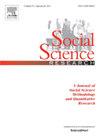What are we modeling? An evaluation of depressive symptom trajectory models from adolescence to early midlife in the Add Health cohort
IF 3.5
2区 社会学
Q1 SOCIOLOGY
引用次数: 0
Abstract
It is critical to understand the development of depressive symptoms across life stages. Existing research has primarily explored this from a life course perspective, yielding inconsistent depressive trajectories, and raising questions as to whether life course processes best characterize the evolution of depressive symptoms across life stages. This study compares ten longitudinal models from four theoretical perspectives (life course, enduring, autoregressive, and hybrid) to identify the best-fitting, theoretically-informed model of depressive symptom development from adolescence to early midlife. Results indicate a hybrid model that combines enduring and autoregressive perspectives outperforms traditional life course models and best fits the data. This hybrid model suggests depressive symptom levels at baseline remain relatively stable across life stages, with past symptom levels predicting future levels. Additionally, it reveals racial/ethnic and gender differences in symptom levels in early adolescence, as well as racial/ethnic differences in longitudinal patterns. These findings advance theoretical understanding of depressive symptom development among US young adults across early portions of the life course.
我们在建模什么?Add Health队列中从青春期到中年早期抑郁症状轨迹模型的评估
了解抑郁症状在人生各个阶段的发展是至关重要的。现有的研究主要是从生命历程的角度来探讨这一点,得出了不一致的抑郁轨迹,并提出了生命历程过程是否最能表征抑郁症状在生命阶段的演变的问题。本研究从四个理论角度(生命历程、持久、自回归和混合)比较了10个纵向模型,以确定从青春期到中年早期抑郁症状发展的最适合的、有理论依据的模型。结果表明,结合持久和自回归视角的混合模型优于传统的生命历程模型,并且最适合数据。这种混合模型表明,抑郁症状的基线水平在整个生命阶段保持相对稳定,过去的症状水平可以预测未来的水平。此外,它揭示了青春期早期症状水平的种族/民族和性别差异,以及纵向模式的种族/民族差异。这些发现促进了对美国年轻人在生命早期阶段抑郁症状发展的理论理解。
本文章由计算机程序翻译,如有差异,请以英文原文为准。
求助全文
约1分钟内获得全文
求助全文
来源期刊

Social Science Research
SOCIOLOGY-
CiteScore
4.30
自引率
4.00%
发文量
0
审稿时长
65 days
期刊介绍:
Social Science Research publishes papers devoted to quantitative social science research and methodology. The journal features articles that illustrate the use of quantitative methods in the empirical solution of substantive problems, and emphasizes those concerned with issues or methods that cut across traditional disciplinary lines. Special attention is given to methods that have been used by only one particular social science discipline, but that may have application to a broader range of areas.
 求助内容:
求助内容: 应助结果提醒方式:
应助结果提醒方式:


